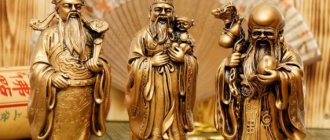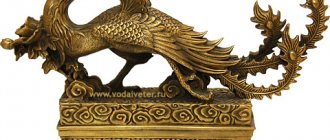In this article we will consider the following questions with you:
- Who is Goddess Lakshmi?
- What does Lakshmi like?
- What doesn't Lakshmi like?
- How to attract Lakshmi?
Lakshmi is the wife of Vishnu, his manifested feminine energy. She personifies all the benefits of spiritual and material life, Lakshmi can be described as:
- Strong will, radiant luck, great success, unshakable faith, victory over vices, selfless love, the source of all wealth, abundance of the universe, the joy of a child, true happiness, a harmonious family;
- Motherhood, piety, creation, prosperity, longevity, pleasure, comfort, purity, abundance, generosity, peace, compassion, sincerity, positivity, harmony, bliss, glory, power, diplomacy, splendor, dignity, greatness, creativity, honor, wisdom, kindness, beauty, charm, charisma, grace, tenderness, modesty...
If the meanings of the above words are raised to an infinite degree
, even 0.0001% cannot describe that infinitely blissful, indescribably beautiful, nectar-like Goddess Lakshmi.
She embodies the purest, most precious and sublime nature of the universe. It leads to a harmonious, prosperous life for the benefit of all living beings.
Lakshmi is a refined, refined, filigree energy that transforms, purifies, transforms, and bestows benefits on its admirers. Faith, worship, remembrance of Lakshmi is incredible luck and great luck.
Gods of wealth, prosperity and luck.
We all want to be happy.
And many believe that wealth and prosperity will bring them happiness. And some people simply believe in luck. Let it be as they wish, and let them be rewarded according to their dreams. Let's just see what divine entities help in this matter. The presence of which gods promises both wealth and good luck. What gods exist that help in money matters? Read about them, look at them. Decide who suits you best. Try to have an image of this God in an accessible place, and from time to time contact your patron. It is said that this is very conducive to achieving wealth.
Patron Gods of Trade and Economics will be very interesting .
SLAVIC GODS OF WEALTH
VELES is the economic god, he was also responsible for domestic animals, it’s not for nothing that he is the “cattle god”, and he was not the last figure in the arable land. The last few unharvested spikelets were called “Veles on the beard.”
MAKOSH - Goddess of fertility, patroness of needlewomen. Some read her name as "Mother of Purses." As the Goddess of Fertility, she is also the Goddess of abundance and prosperity.
ABOVES OF HEAVEN - sometimes this symbol is called the Agidel amulet. And so you can’t immediately tell who the sign is dedicated to: the Gods of Water use it, and the Gods of Air, and there is a place for it in Meteorological Magic. A multi-valued symbol, it develops intuition, attracts happiness and good luck (and therefore the Gods of Wealth and the Diviner Gods also consider it theirs). And also, as a sign of the Goddess Agidel, the sign “Heavenly Abyss” is recommended to all women - to strengthen and increase their beauty and charm (hence, it also turned out to be one of the Goddesses of Beauty).
They say that this sign has a special power: it will protect you from various troubles and worries, it will take away bitterness and failure from you, and it can also protect your thoughts from darkness.
WATCHMAN is a protective sign belonging to God Chur.
The sign is somewhat similar to a person. In this case, a person who guards borders. The sign protects and protects, and, as a result, helps to increase prosperity and wealth. The gods of wealth also welcome this sign.
The sign can be made of any material: burned on birch bark, carved from wood, smelted from metal. This could be an imprint on ceramics or embroidery on a towel.
GODS OF WEALTH IN OTHER PEOPLES.
The most famous of them are the seven gods of happiness - Ebisu, Daikoku, Bishamon, Saraswati, Hotei, Juradzin and Fukurokuzen.
“team seven” from Japan, India and China. Figurines of these gods of luck (all together, or each separately, or one of them) can often be seen not only in homes, but in the most unexpected places: in offices, restaurants, shops.
Let's see what these mysterious eastern deities are, who have been bringing goodness and prosperity for more than one millennium.
EBISU - God of honest work and prosperity. Brings success in the profession
PEDIGREE. It is believed that he comes from Japan, and his teacher and friend is the god of wealth Daikoku. They say that at birth he was crippled, but then a miracle happened and his arms and legs grew, although he remained slightly deaf.
SACRED ANIMAL (SYMBOL): sea bass (tai fish)
I'm near the statue of the god Ebisu
SYMBOLISM. Ebisu symbolizes honesty in business and justice
APPEARANCE. An ordinary fisherman with a fishing rod, wearing a flattened cap.
FANS: fishermen, farmers, sailors
WORSHIP DAY - 20th of every month.
ACTIVATION (CALLING THE DEITY) - place his figurine near the flowing water and call the god of luck Ebisu
DAIKOKU is the god of wealth, as well as a god who, with the help of a magic hammer, can fulfill any desires of people. God of cuisine and agriculture.
OTHER NAME: Daikokuten or Great Black
PEDIGREE. He comes from India, where his name was Mahakala, and then he came to Japan through China.
APPEARANCE and ATTRIBUTES. He always carries a bag of rice and a hammer with him. True, they say that there is not always rice in the bag. Sometimes there are coins or even precious stones there. And as soon as a rat gnaws a hole in the bag, these pebbles (or coins) begin to fall to the ground. So know: rats are useful creatures, especially if they are accustomed and gnaw through a bag of wealth so that their owner’s wealth increases.
PATRONAGE. This deity used to favor warriors, but then abruptly changed his role and decided that wealth was somehow more reliable
ACTIVATION (CALL OF THE DIVINE) - performance of a special sacred dance of Daikoku
BISYAMON is a warrior god, but at the same time he is the god of prosperity and wealth. God is the protector of temples. He is the guardian of the North, able to exorcise demons. He punishes Evil, and gives good people treasures (or at least wealth).
SYMBOLISM. Bishamon is dignity itself.
PEDIGREE. They say that he comes from India. His middle name is Tamonten - this is his name as one of the four heavenly guardians. He is strong and merciful. And in Sanskrit his name means God who hears everything.
APPEARANCE and ATTRIBUTES. Warrior in full samurai armor with a spear and a small model of a pagoda (hoto)
SACRED ANIMAL - dove
FANS: military, doctors, lawyers
BENTEN (SARASWATI) - goddess of wisdom and luck.
OTHER NAME - Benzaiten
HABITAT: water, sea. In India she was considered the deity of rivers
SPHERE OF INFLUENCE: art and thirst for knowledge, wisdom and love, luck. Patronizes artists, musicians, writers.
SPECIAL PATRONAGE: music and water (water shows are exactly the elements where she is rightfully the first)
PROTECTION. They say that the Saraswati figurine can protect from the water element, and from other natural disasters.
SYMBOLIC ANIMAL - sea dragon, snake.
She is said to have sixteen assistants, one for each art form.
KHOTEY is the god of happiness and good nature, compassion and carelessness, cheerfulness and abundance.
The NAME is Japanese HOTEI - canvas bag - and it (the bag) is really present in all images of this god.
APPEARANCE: very fat, cheerful old man
AS A TALISMAN - the Hotei figurine is used to attract wealth and good luck. And they also talk about the number 300. That’s how many times (three hundred!) you need to stroke Khotey’s plump belly, while wishing good things for yourself and those around you, and then happiness will definitely pour out of his bag.
SPHERE OF INFLUENCE: he inspires people to drink deliciously and eat plentifully. Very popular in the restaurant business. They also say that he was a predictor, and all his predictions certainly came true.
JYURODZIN - god of longevity. He is not considered a drunkard, but he drinks a lot of sake.
SPHERE OF INFLUENCE - can give longevity, and this in itself is happiness and good luck.
SYMBOLIC ANIMAL - crane, turtle and deer.
LEGEND. They say that there was a Taoist hermit who sought and found the elixir of immortality. He wrote down the recipe for longevity in his scroll of wisdom, attached it to his staff, and now the god Dzyuradzin walks the earth, and can give many years to those who greet him.
How to attract Lakshmi?
Develop virtuous qualities.
Since Lakshmi personifies the principle of success, prosperity, strong will, She is favorable to people who develop the following qualities: punctuality, responsibility, hard work, truthfulness, integrity, honesty, responsiveness, attentiveness, determination, leadership, activity, awareness, wisdom... everything related to creation, transformation, improvement, serving the Dharma and maintaining the Dharma - such people are blessed by Lakshmi.
Be responsible.
Lakshmi is especially favorable to responsible individuals who are not afraid of serious responsibilities, take on large-scale creative projects and bring them to completion, it is very favorable if these projects are related to improving the ecology of the planet, the development of nature, saving living beings, charity, and of course spirituality.
You might be interested in: How can you extend your life by saving animals from death?
Love family and children
. Lakshmi is merciful to all family men who look after, appreciate, respect and love their wives, as well as to devoted and faithful women who, despite any difficulties and trials, follow their husbands. Lakshmi is where Her husband Vishnu is, so if a woman intends to reveal the aspects of Lakshmi in herself, she should respect and help her husband, serve him with a kind heart, like God Narayana himself, Lakshmi really likes this. She is infinitely merciful to all couples who embody and nurture sublime souls, avoid conflicts, respect each other, build virtuous families, engage in charity, and set a good example for society.
Treat money with respect.
Money is the manifested energy of Lakshmi, so you need to treat it like the Goddess herself - with respect and love, you need to value any amount, every coin or bill in your wallet. After all, Lakshmi is always where she is revered, appreciated and loved. Money does not tolerate wastefulness, squandering and negligence, at the same time it does not like greed, stinginess, and long-term stagnation. Therefore, it is important to find some kind of middle ground, learn how to give, receive, invest and accumulate money correctly. When there is love and respect for money, it is easy.
They are not afraid to give, to be generous.
You can only receive by giving - this is an eternal universal principle. Therefore, Lakshmi is kind and forgiving towards generous, sympathetic, kind people who are of real value in society and can solve the problems and pains of other people. The more people you are able to help and make life easier, the more favorable the Lakshmi energy will be to you.
Be grateful, honor your parents, respect your elders.
The ability to be grateful is an invaluable skill that makes any person happy, regardless of any external factors. Lakshmi is always with grateful people. To experience and express gratitude to parents (no matter what they are) means to be grateful to Lakshmi herself, since she is also associated with the Great Mother of all living beings. Parents are not chosen, but loved, thanked and honored - follow this principle and you will be blessed by Lakshmi.
Lead a healthy lifestyle, practice yoga.
Lakshmi always blesses with good health, a beautiful, strong, resilient body, everyone who strives for this and takes appropriate actions.
Lakshmi is knowledge plus action, not just raw knowledge, but knowledge plus action based on will and concrete steps .
That is, it is not enough to know about a healthy lifestyle and health practices; they still need to be carried out – steadily, consistently, regularly. Lakshmi always blesses everyone who follows a healthy lifestyle, especially if it is done for sublime reasons, such as through yoga.
Learn, strive to be a pro in your field.
Lakshmi is always there where useful knowledge and science are spread and the learning process takes place
.
She favors educated people who share their experience, talent, and knowledge for the benefit of others. Who do not hide or appropriate them for themselves, but joyfully give them to the world. It is worth adding that Lakshmi is always there where sacred texts are studied and followed.
We recommend reading: 5 sacred texts about non-duality that pacify the mind and lead to God
Maintain order and cleanliness, strive for beauty.
First of all, Lakshmi comes to a house that is perfectly clean and tidy. The Goddess has excellent taste, she prefers stylish, high-quality things, unique decorative items, exclusive handmade furniture, porcelain dishes, designer textiles, fashionable expensive clothes, precious stones and metals - everything beautiful, exquisite, luxury.
Lakshmi loves when people take care of the surrounding space and household items. She settles in houses where it is comfortable, cozy, smells nice, where everything is decorated with flowers, beautiful paintings and luxury items.
Lakshmi's energy comes into the material world through flowers that are particularly tender and beautiful: lotus, rose, dahlia, peony, narcissus. A basket of fresh fruit and a vase of fresh flowers attract the energy of Lakshmi into the house.
Decorate the space with spiritual images.
Lakshmi likes to have images (murtis) of deities and saints hanging on the walls in golden frames. The image of Lakshmi in the house attracts success and prosperity, protects against everyday adversity and poverty, helps to gain confidence, and promotes the recovery of the sick. The southeastern sector is best suited for placing the Lakshmi murti; it is also placed at the entrance or in the hallway. The placement of Lakshmi in the office will also be successful.
Believe and worship God.
Lakshmi is often depicted massaging the feet of her eternal husband Vishnu, whom She accompanies in all incarnations, and She always comes to where God is worshipped. Therefore, if an altar is installed in the house to worship God, then the Goddess of Prosperity herself is present there.
It is believed that worshiping Lakshmi brings prosperity, success, wealth and the achievement of any goals. The following methods are used to worship Lakshmi:
- Chanting the sacred names of Lakshmi;
- Repetition of Lakshmi mantras;
- Singing bhajans (songs in praise of Lakshmi);
- Reading prayers and sacred texts of Lakshmi;
- Meditation on the image of Lakshmi;
- Visualization and merging with the image of Lakshmi;
- Carrying out pujas (ritual offerings) to Lakshmi;
- Simply remembering Lakshmi, listening to Lakshmi's mantras, reading sacred texts about Lakshmi, about Her qualities, attributes, glory and greatness.
Friday (Venus day) is the most favorable for worshiping Lakshmi.
It is recommended to worship Lakshmi in new or clean clothes, after taking a bath (shower).
Make offerings to the Goddess.
For offerings to Lakshmi, it is favorable to use: sweet rice, sweets, coins, milk, coconuts, bananas, mangoes, gold jewelry, pearls, flowers (especially lotuses), bride's jewelry (especially nose rings). Lakshmi also loves all dairy products, honey, dates, figs, almonds, grapes, ghee. She likes incense, especially delicate floral scents such as rose, jasmine.
An important part of the Lakshmi worship rituals is the purification and decoration of the altar and place of worship. It is advisable to decorate figurines and images of Lakshmi with fresh flowers, stones, jewelry, and wreaths. It is auspicious to place an image or figurine of Her husband Vishnu next to Lakshmi. If possible, place an image of Ganesha on your altar. As a rule, Ganesha mantras are read before starting any business or ritual. An image or figurine of the God of Wealth Kubera will also well complement and enhance the energy of Lakshmi.
Note:
it should be understood that by honoring Goddess Lakshmi, we honor the very principle of the Divine Mother, energy (Shakti). This is the greatest creative power of the Absolute, which manifests itself in its three Gunas: in the state of rajas She is Saraswati, in the state of sattva She is Lakshmi, in the state of tamas She is Kali.
Read more about the worship of Lakshmi in the e-book:
Sacred knowledge and practices of the Goddess Lakshmi
in the chapter “Methods of worshiping Lakshmi”
Perform tapas.
Usually, worldly people call upon Lakshmi's energy to achieve prosperity, success, health, material wealth, fame, and a certain status in society. But spiritual practitioners, first of all, call on Her, striving for spiritual prosperity, spiritual wealth, spiritual strength and signs of spiritual realization. For them, Lakshmi is the universal energy of spiritual happiness, which arises as a result of their diligent, long-term practice and maintenance of awareness.
Therefore, one of the best ways to invoke the blessings of Lakshmi is to challenge your capabilities, always be in a state of self-overcoming, constantly temper, develop and educate yourself, increasing mental, physical and spiritual strength.
Such a constant challenge to one’s capabilities, working on oneself, developing new qualities, increasing willpower and fortitude is called tapas. Tapas is translated as “spiritual fire”, “spiritual burning”, “ascetic practice”. Lakshmi favors everyone who performs tapas.
Read more about tapas in the book of Master Swami Vishnudevananda Giri: Tapas is the basis of spiritual practice
Conclusion:
in order to attract and retain Lakshmi, you need to constantly work on yourself, is in the process of continuous growth and development, you need to set yourself new challenges, goals, intentions... act confidently and decisively to realize them. You need to be responsible, diligent, disciplined, punctual, keep your word, fulfill obligations and agreements in the best possible way. You must strive to give more than you receive. But the main thing here is faith and devotion to God; Lakshmi always helps and blesses spiritual seekers.
“The touch of Her hands is magnetic.
Their secret and subtle influence purifies the mind, life and body.
And where She touches with her magical feet, a magical stream is immediately built there, which bewitches with bliss.
However, it is not easy to meet the demands of this enchanting force and maintain its presence...
Harmony and beauty of the mind and soul, harmony and beauty of thoughts and feelings, harmony and beauty in every movement and action outside, harmony and beauty in life and the environment - this is the requirement of Mahalakshmi.”
(c) Unknown source
People's attitudes towards wealth and prosperity
From the very beginning of human development, everyone has strived not only to survive, but also to thrive in all areas of life. In any era, if wealth and material wealth were not valued, then luck, authority and fame among others were valued.
People were afraid that they simply could not achieve success on their own, which is why they turned to deities who brought wealth and prosperity. Many believed in the protection of the gods and prayed to them. They always shared what a person had with the deities, made donations, hoping for mercy and help, which historically came sooner or later. But the gods helped or it was just luck, you and I won’t know.
Legends and descriptions of Western and Eastern gods, responsible for prosperity and good luck, have reached our time.
Regular and military deities
To attract wealth, place a figurine of Tsai Shen Ye in the money zone - a powerful and immortal deity who protects from troubles, relieves debts and attracts good luck. According to Feng Shui practitioners, this god of prosperity answers all requests - just make a wish and wait with faith for its fulfillment. She is depicted on a tiger with a whip or a bar of gold in her hands.
Kuan Yu is the martial god of wealth according to Feng Shui. It not only protects human well-being, but also allows him to win victories in competition. He is depicted wearing the cloak of the Nine Dragons. It is better to place his figurine near the door - it will protect the house and its inhabitants from failures and envious people.
We have selected interesting articles for you:
How do representatives of the elements Fire and Water get along?
11.12.2021
I Ching - Book of Changes
27.01.2019
Bi Gan is an ordinary deity responsible for the proper management of wealth and benefits. It helps to attract new opportunities in life and patronizes new endeavors.
Xi Wang Mu is a goddess who symbolizes all human aspirations, including wealth, fame, prosperity, and long life. By installing her image or figurine at home, you can protect your family from poverty and disagreements. Xi Wang Mu helps improve material life and establish harmony in the home. It is better to install it near the main entrance to the house, then it will also protect the family from troubles and bad people.
Pi Kan is the god of prosperity and prosperity. He is depicted in two forms: as a warrior and an ordinary citizen. It is believed that Pi Kan in the 12th century was a brave warrior and protected the poor.
God Tua Peh Kong is dressed in a robe and holds a gold bar in his left hand. It brings money to the owner, gives power, strength and luck. You can install a figurine with it anywhere in the house, the main thing is that your gifts are near it.
Slavic gods of wealth
In pagan Rus', the person who had a huge barnyard was considered rich and lucky; in other words, wealth was measured by livestock. To increase their wealth, people prayed to Veles, the god of wealth, popularly called the god of cattle.
Scripture says that it was Veles who set the world in motion. Such concepts as day and night, seasons, bad and good appeared. Veles taught people to appreciate what they have and to achieve more by overcoming difficulties.
To attract good luck from the god of wealth, it was customary for the Slavs to leave donations to him or, one might say, a tribute from everything that was added to their lives. Whether it was a harvest harvested in the fall or a profitable trade deal. Donating what was acquired was considered a guarantee of Veles' patronage in the future.
The Slavs represented the pagan god of wealth according to one source:
- a man dressed in bull's skin;
- a richly dressed old man with a beard made of wheat.
After baptism in Rus', the functions of Veles were transferred by people to St. Nicholas the Wonderworker, whose image to this day is similar to the description in fairy tales and chronicles of the god Veles.
Veles - God of what
First of all, the Slavs considered Veles the God of wisdom. That is why he patronized the priests and wise men. The spiritual mentor led the path of development for all those who had the desire to comprehend the truth of existence. He also told them to live according to truth and conscience.
In addition, Veles, embodied in various guises, was considered the patron of the following spheres:
- the lord of virgin nature - the bestial god;
- protector of travelers - master of the roads, guide of all roads;
- Black God is the ruler of Navi, the master of the unknown;
- lifetime tester and posthumous judge;
- lord of magic;
- patron of trade, bestowing prosperity;
- giver of wealth;
- patron of the arts;
- a warrior who protects from visible and invisible enemies;
- god of luck;
- god of dead and living water.
What is its strength and what is it responsible for?
The ancient Slavs believed that it was Veles who managed to unravel the secrets of the universe, to know the forces of darkness and light. Therefore, he was responsible for their storage. His great mind allowed him to subjugate and control the 4 elements, which led to the emergence of the flow of time.
Veles absorbed all the wisdom of the Universe, as a result of which he became responsible for preserving the greatest secrets of the Universe and enlightening a special caste of humanity, which included magicians, sorcerers and seers.
IMPORTANT. The ancient Slavic God showed the greatest disposition towards storytellers and poets, since they knew how to convey the divine will to mere mortals in a form accessible to perception.
Veles was responsible for the fertility of the lands, fruitful years and the wealth of the Slavs. There were beliefs that his beard descended from heaven to earth, turning there into a source of life for all flora and fauna.
REFERENCE. In those days, there was a tradition that provided for leaving a bouquet of ears of corn and flowers for Veles’s beard upon completion of successful agricultural work.
In addition, the ancient Slavic God was responsible for everything supernatural and unknown; his power was directly related to natural cycles. He could trigger a cycle of typical events and create powerful illusions.
You may be interested in: Horse: Slavic God of the winter sun, mythology and legends, symbols and amulets of God
Veles' Law
Veles was considered to be one of the wisest representatives of the pantheon of Gods. Even his main law was filled with the deepest prudence, since it stated that a person must coexist harmoniously with the world around him.
That is why the peoples who worshiped him respected nature and creativity, appeasing their patron with the help of bloodless sacrifices.
ATTENTION. It was customary to bring kvass, nuts, honey, berries, copper coins and medicinal herbs as gifts to Veles.
Commandments
The commandments of the Slavic God Veles are as follows:
- Love the world around you as you love yourself, because it is part of you.
- Don't look for harmony outside, it is inside you. Be grateful to Nature for your strength, which you do not waste in vain.
- Your capabilities are insignificant compared to the world's forces.
- Expect peace and don't forget about farming.
- The city and the village are the body of darkness and earth, respectively.
- If you find yourself in a city, illuminate the darkness around you with your inner light, you will learn the essence of the Book of Wisdom.
- The world needs the power of light, like spring water.
- You will not force anyone to drink and shine.
- The Light of the Gods has life-giving abilities.
- A bright life is always nearby, it will guide you, making you omnipotent.
- A timely visit to the soul will have a beneficial effect on it.
- There is no need to be afraid of the darkness if you exist with pure, bright thoughts.
- You won’t see clearly if you hide from the darkness, and the burning light only blinds you.
- You live if you understand the great world around you.
- Without understanding, life becomes a burden.
- Everything has its own measure.
- If you understand the will of the Gods and lead a proper lifestyle, then you will know true happiness.
- Greatness will not allow outsiders to see your weaknesses.
- One should live in wisdom, peace, love and goodness.
- Today is the way to tomorrow.
- Keep peace in your soul and create peace in the Universe.
- Everything sown by the Gods is the essence, your food, created for your good.
- Don’t muddy the water you drink, otherwise it will become dopey hops.
- There are 4 measures in the world: breathing, thoughts, conscience, shame.
- Take the breath of light, and the whole world will transform around you.
- There is joy and light in the souls of the living, therefore they live in the Upper Worlds.
- Live in your worlds, and other worlds will open to you in due course.
- The world of our beginning is the world of your end, but the world of your beginning is not in the world of our end.
- Do not be inactive, because only work will open the doors to a new world of the future.
Roman gods of wealth and prosperity
The Roman Empire is famous for its wealth. The people believed in the protection of the goddess Fortuna, who brought good luck. Initially, the goddess was prayed for fertility and weather, later she was addressed as the goddess of fate. No one knows in advance how fate will turn towards a person.
Fortune is most often depicted as a girl with a blindfold. It is the bandage that symbolizes the fact that the goddess does not evaluate the situation, but simply distributes good luck.
A number of worlds claim that Pluto is the god of wealth in Rome. He was often compared to the Greek Plutos. Pluto in Rome is the god of money and wealth.
For good luck in your career
Lakshmi helps people with pure thoughts achieve social recognition and a high position in society. However, if a person’s heart becomes callous and deceitful, the luck bestowed by the goddess will leave him forever.
For career growth, you should practice a special Gayatri mantra (at least 108 repetitions at a time) for 36 days in a row, starting from the time of the waxing of the moon:
Don't forget that one of the main aspects of the goddess is mercy and compassion. If a person is hard-hearted and does not intend to improve, it will be impossible to achieve contact with the goddess.
Feng Shui
Eastern countries: China, India and Japan - gave the world seven deities who give wealth, abundance and good luck. Today we know how the seven gods of luck and wealth are depicted in the form of small mascot figures.
According to another belief, the monk Tenkoy learned about the seven blessings that identify each deity. Nowadays, talismans are popular, most often made with wood carvings using the netsuke technique.
What are Hotei figurines usually made from?
Before the advent of modern materials, figurines of this deity were carved from wood and ivory. Gold, silver and natural dyes were used for decoration. Much later, figurines began to be made from clay, glass and porcelain.
Large statues were often carved from natural boulders and large pieces of volcanic pumice.
Rich Chinese and Japanese ordered figurines of deities made of jade, opal and agate from stone cutters. When decorating, black, silver, green, red and white paints were often used. Nowadays, different types of metal alloys, plastic and many other materials are used to make figurines.
Daikoku
The god of wealth and prosperity in Japan is Daikoku. The god is depicted in national costume with a mallet in his hands and a bag of rice. Sometimes the god Daikoku is depicted crawling out of a bag or in a bag. He is considered the god who gives wealth.
In Japan, it is believed that the animal rat lives only in rich houses, where there is an abundance of food and supplies.
According to legend, the Daikoku bag contains a lot of rice, coins and jewelry. It is the rat who gnaws the bag while dancing with a mallet, calling luck and wealth into the world, and all the contents pour out of it.
It is recommended to place the talisman in a visible place where it would most often catch the eye. According to legend, it is attention to the talisman that will reward you with prosperity. If you take the palms of Dayokoku and rub it, then wealth and prosperity will come to you.
How to get in touch with the goddess
To earn the favor of the goddess and resonate with her vibrations, it is necessary to practice mantras using her name.
Lakshmi's main mantra sounds like this:
Another glorifying mantra goes like this:
Both mantras are repeated an odd number of times, a multiple of three - 12, 24, 108. The more repetitions you say, the more closely you will enter the flow of the energy of the goddess.
The attention and favor of the deity can be attracted by placing a figurine in the house or printing an image on a printer. Worshiping the gods always brings them favor.
To successfully practice mantras, you need to combine the repetition of sacred sounds with meditation on the image. To achieve success in life, practice the Gayatri Lakshmi mantra for 36 days, 108 times at sunrise.
The symbols of the goddess that attract her energy are all large flowers, lapis lazuli, yellow or red jade. The metal that expresses Lakshmi's abundance is gold.
You can make an altar to the goddess yourself. To do this, cover the surface with a new cloth with golden threads, place a figurine and symbols - gold jewelry, stones, flowers. You can smoke an aroma with the smell of lotus or other flowers.
At any time, you can turn on a recording of a mantra glorifying Lakshmi and meditate on her image:
Ebisu
The god of luck and happiness, Ebisu, is the only one of the seven happiness of Japanese origin, considered the god of hard work. According to legend, a boy named Hiruko was born without arms, legs or bones. At the age of one, he was carried away on a boat to the sea, where he had to survive in inhumane conditions. Fate subjected him to terrible trials. He swam for a long time until he washed up on the island. He was saved by a fisherman named Ebisu Saburo, who subsequently raised him as his own son. When the boy was three years old, the gods had mercy on the baby, taking into account all the difficult trials he had passed. So Hiruko’s arms and legs grew, and he became a deity named Ebisu.
God Ebisu is depicted as a cheerful old man with a fish in his hands and a fishing rod or fan. Most often, the gods Ebisu and Daikoku are placed together; according to legend, their strength together is more powerful and will definitely bring happiness.
Fortune's Form
Fortune was known in all corners of the Roman Empire. What can I say - it also appears as a common noun in the vocabulary of modern man. This goddess occupied a strong place in the ancient pantheon.
According to some myths, her father was the great Titan Ocean, but some legends call Fortuna the daughter of Jupiter, the supreme deity. The goddess Forta (or Fors) was considered her ally, who was the patroness of a happy occasion. However, in some regions of Ancient Rome the names of the goddesses were combined, adding a kind of “title” to the goddess of luck - Force Fortuna.
Video version about the goddess Fortuna
Images of Fortune vary significantly. Moreover, from the statues of the goddess one can determine which time period they belong to, since in different eras people represented Fortune in different ways.
In the early images (and they are the most common), the goddess appears to us as a beautiful young woman holding a cornucopia from which gifts are pouring out. Other sculptures show Fortune next to the wheel she turns.
Unknown artist “Fortune riding a wheel”, 16th century Location: National Museum, Stockholm, Sweden
Bishamon
God Bishamon was borrowed from India, where he was the god of war or in other words, the warrior God who protected and guarded the heavens. In Japan, it is believed that Bishamon brings people wealth and early luck, being officially the god of wealth. In Japan, it is believed that the Warrior God fights on the side of good, destroying evil in the world, giving happiness to everyone who asks.
Most often, Bishamon is depicted in armor and a helmet, holding a weapon in his hands. It is believed that if you keep the Bishamon figurine with you or in a visible place, then financial improvements will come.
Activating the Divine Talisman
It is believed that simply buying a figurine is not enough. A special ritual must be performed to activate her divine power. To do this, rub her stomach 300 times clockwise.
During activation, the person should be joyful and cheerful.
You cannot be distracted by extraneous matters, because... the deity may take this as a sign of disrespect. Such manipulations must be carried out every day until the desire is fulfilled. It's better to do this before going to work or an important meeting.
Hotei
Hotei is the god of wealth. God Hotei is the god of prosperity, fun and communication. According to legend, he was a wandering monk of Tsitsa who brought fun with him. The monk traveled with a bag, or hotei in Japanese. According to legend, it was from his bag that Hotei extracted everything that people asked for. So Hotei became the god of wealth. It was believed that he had the whole world in his bag. After the monk died, he was considered the eighth reincarnation of Buddha. Hotei is considered the only mortal god from the “seven of fortune.” Hotei is often compared to a laughing Buddha.
God Hotei is depicted with a bag and a coin or piece of gold. His figurine should be placed in a prominent place in your apartment or office, and it will definitely bring wealth.
The story of the god Hotei
Figurine of the god Hotei to attract wealth.
Researchers of Japanese and Chinese cultures believe that the prototype of the god Hotei was the monk Qi-Tsi, who lived in the 10th century, who, instead of engaging in spiritual practices, tried to spend his days in idleness and fun. This man was a lover of strong alcohol and rich food, so he had a lot of excess weight and a big belly.
In squares and markets, he predicted the weather and begged for alms. This is how the monk earned his living. He always carried a canvas bag with him. That was his only personal property.
The name of the god Hotei is translated from Japanese as “linen bag.”
Over time, people began to notice that wherever Qi-Tsi appeared, happiness reigned in the future, so they began to carve monk figures from wood and stone so that they would bring good luck to the house.
Another legend has reached modern times, explaining the origin of this deity. It was considered one of the forms of Maitreya. This man was too handsome, but he had to reject women who fell in love with him.
To stop breaking the girls' hearts, he reincarnated as an unattractive man and began to give them happiness and wealth as consolation. Since then, he began to be considered a deity who brings material well-being.
What gives people
The deity Hotei brings only goodness and joy. Large statues of him in Japan and China are often placed by merchants near their shops to attract profit. It is recommended to install small figurines in homes and offices. They are no less effective.
If the god Hotei favors people, he is able to bring into their lives:
- joy;
- wealth;
- longevity;
- happiness;
- generosity from strangers, etc.
It is also possible to gain mutual understanding with relatives, fulfill cherished desires, strengthen intuition, discover new opportunities, get rid of illnesses, and rapid career growth.
Buddha Hotei favors schoolchildren and students, helping them master new knowledge and skills. You can take his small figurine with you to exams and other important events. This will give you courage and help you get better results.
As usually portrayed
This deity is depicted as a bald, fat man with a large belly, which makes him look like Buddha. His mandatory attributes are a wide smile and a friendly expression.
God can sit on a pedestal or stand.
He is depicted dressed in monastic robes. In addition, Hotei is also found with a bag. Often the image of a deity is complemented by a thick staff, rosary or large beads.
Fukurokuju
God Fukurokuju is the god of wisdom and longevity, his origin is Chinese. It is Fukurokuju who is the first Chinese god of wealth. According to legend, Fukurokuju influenced the Emperor of China with his wisdom in the matter of recruiting young men from the villages, thereby earning the worship and honor of the Chinese people. Legend also says that Fukurokuju is the incarnation of the North Star of the south. The deity Fukurokuju is not alien to the company of women and the use of alcoholic beverages. Love for human pleasures does not interfere with being a god.
The figurine of God is depicted as an old man with an elongated head; the people associate this feature with wisdom. In the hands of the sage is a scroll where all the wisdom of the world is described and a staff. In Japan there is a legend that if you put a figurine of God under your pillow on New Year's Eve, you will have a prophetic dream. In the morning, the Japanese always write it down on paper and analyze it.
Where to place the talisman according to Feng Shui
To receive Hotei's favor, you need to correctly place his figurine in the house. Where to put it depends on what the person wants to receive. A harmoniously arranged space has a positive effect on human energy.
According to the teachings of Feng Shui, the zone of career and material wealth is located in the northern part of the apartment. This is the most suitable place for the Hotei figurine.
For a figurine decorated with a pearl, the best zone is the northeast. If a married couple bought a figurine of Hotei in order to quickly have children, it is worth placing it on the western side.
Jurojin
Jurojin is considered the god of longevity. Jurojin is most often compared to the god Fukurokuju; his appearance, origin, and attributes are the same. Sometimes it is said that two deities live in one body. An old man can be depicted with a staff, sometimes with a musical instrument, the sound of which, according to legend, makes a person look younger, or a turtle, which is a symbol of longevity in Japan. The only difference between the gods is that the shape of their heads is different. God grants not only longevity, but also teaches people honors in old age.
A figurine of the deity Jurojin given as a gift for a birthday prophesies longevity for the birthday person.
Legends and myths about the ancient Slavic God
There are many myths and legends about Veles. The most common of them concerned his birth, the upbringing of young Veles, his feelings, descendants and assistants.
How Veles was born
The mysterious purpose of Veles lies already in his birth. And only the Progenitor Rod knows it completely. At the birth of the world, the Creator Rod distinguished between darkness and light, and separated order from chaos, pacifying the virgin power of creation and destruction.
Next, he created dark and light Gods, most of whom he endowed with consistent and integral morals.
IMPORTANT. Each deity was created only from dark or light particles of chaos.
But an entity was required that would help establish a balance between opposites, reduce the intensity of passions and help the Slavic Gods come to an agreement among themselves. This is how Veles appeared - he was created not only from dark and light particles, but also from primordial power, the essence of which is known only to the Creator. He was endowed with a complex and contradictory character, which brought him as close as possible to representatives of the human race.
You may be interested in: Perun: God of thunder and lightning among the Slavs, origin, mythology and legends, amulets and symbols of the Thunderer
Raising Veles
The young mediator of three Worlds grew up at the crossroads of 3 roads. For him, Rod created Mother Amelfa Zemunovna, whose character was particularly strict. When the young God grew up, he was given to be raised by Viya, the ruler of all souls in Navi.
Under his leadership, Veles studied sorcery. It was here that the seeds of darkness necessary for the formation of a contradictory character were sown in his soul.
The adventures of Veles in his youth
The people considered Veles to be crafty, cruel and violent. He acquired similar characteristics in his youth, when he persistently comprehended the truth and learned to manage his contradictory desires. It was very difficult for him to restrain his anger if something did not go as he would like.
REFERENCE. Veles's travels around Yavi in search of himself resemble the beginning of the life journey of any mortal.
That is why people had a lot to learn from the evil God. Endowed with enormous power, Veles was still able to curb his temper and understand that, having negative desires, one can always move towards the light and act according to the Rule.
Love Veles
Slavic legends say that Veles is fully familiar with the feeling of love. At the same time, he behaved like a foolish youth overwhelmed by passion. So, when he met Diva-Dodola, unquenchable desires flared up in him. But the proud beauty gave preference to Veles’s friend Perun.
The young God did not want to give in and lulled the Diva with the scent of a beautiful flower, into which he himself had turned. After Dodol, she gave birth to a baby, who over time became another member of the pantheon of Gods.
ATTENTION. Yarilo is the son of Veles.
But the Slavic God was also capable of sincere feelings. He had a tender relationship with Yaginya, who was in many ways similar to the God of the Three Worlds. The beauty agreed to become Veles’s wife without hesitation. But the hasty marriage was not to the liking of Amelfa Zemunovna, who bewitched Yaginya and ordered the servants to drown her. Veles searched for his beloved for a long time and even rescued her from Navi at the cost of his own life.
Descendants (children)
When Veles lived in Yavi, in the guise of a simple man he lived in an ordinary family, where there was a beautiful sister and her 7 brothers. God liked the girl, her relatives noticed this and got married. From that marriage, Veles had three children left: 2 daughters and 1 son, who over time revealed wonderful abilities for sorcery and healing.
From love with the Goddess Morena, the son Dream was born - the God of sleep among the ancient Slavs. And from the fateful meeting with Diva-Dodola, Veles gave birth to another son - God Yarilo.
Assistants
The ancient Slavic God did not act alone. He had a great many assistants. Thus, Veles’s closest associates who make up his retinue include:
- brownie;
- surveyors;
- field workers;
- dozing;
- forester;
- ovnik;
- knotweed.
Benzaiten
God Benzaiten is considered the deity of the water element and eloquence. Benzaiten is the only woman in the lucky seven. According to the scripture, she defeated a terrible dragon that devoured children. It was the woman who charmed him with her femininity and eloquence. Benzaiten seduced the dragon and married him, which radically changed the life of her dragon husband. The deity has Indian roots. In India, Benzaiten is considered an image of femininity.
The goddess is most often depicted naked or in beautiful clothes, creating the most sophisticated image possible. In rare cases, the goddess is depicted with a snake or on a dragon. A Benzaiten figurine will bring family well-being to every woman.
Throughout history, many people worshiped the gods and believed in their powerful power. With or without the help of divine power and protection, every person by nature strives to survive, and therefore to thrive. Any person desires more not only in wealth, but also in luck.
How to contact and communicate with God Veles
Veles agrees to communicate exclusively with his followers. To establish contact, you need to bring a prayer or come to a place of glorifying God. The forest can act as a natural altar. Ideally, there is a source of water nearby.
REFERENCE. The demand is brought through the fire of the fire.
Since sulfur is considered an undesirable element, lighting a flame with matches is strictly prohibited. After lighting, you should say a prayer, throw the offering and wait for natural extinguishing. You cannot put garbage in the fire; only collected branches should be used.
ATTENTION. The requirement can be left on a stump that has formed naturally.
Prayers
Before bringing the required prayers to Veles, prayers should be offered. It is best to do this at night. Most of the texts have been lost. But those that have survived to this day have undergone changes.
If you want to ask something from a Slavic deity, then you should say the following words: “Like fire burns, like water flows, like birds fly, like animals run. So Veles unlocks locks, opens roads, removes obstacles. The candle burns for 7 days and 7 keys hang on it. Keys fall, locks open, roads to my desire are unlocked. To the glory of Velesov, my word is strong. Truly!
You can praise the ancient Slavic God like this: “You are the crown of everything and earthly existence, our Veles! May my heart be filled with joy from what I have seen and created. For my actions and thoughts are pure. May my deeds manifest themselves as fruits of goodness and glory to my family. Velese, bless! Let it be so!"
IMPORTANT. Upon completion of the reading, God is thanked for his mercy.
Holidays dedicated to God Veles
Celebrations dedicated to Veles were always celebrated on a grand scale. And the days of his veneration were inextricably linked with the change of seasons:
- December 25–January 6 – Big Christmastide;
- February 4-10 – Small Christmastide;
- February 11 – Veles Day;
- March 20-25 – Komoeditsa;
- June 20-25 – Kupala days;
- September 20-25 – Tausen.
On these days, people traditionally engaged in fortune telling, held feasts and asked Veles for protection and patronage.
Previous
GodsMara Goddess of death and winter in Slavic mythology: image, legends, symbols
Frivolous goddess Fortuna
Fortune was a goddess with a fickle and frivolous disposition. She was not known for her loyalty to those who revered her. Today she could bestow a person with all sorts of benefits, and the next day she could completely forget about him. It also happened differently: a complete loser suddenly became the darling of fate, and here the Romans also saw the tricks of Fortune.
Since the choice of the goddess is not determined by anything, she was sometimes depicted blindfolded. It reminded me of the image of Themis, the patroness of justice. But Fortune was less serious and responsible. In fact, the favor of the goddess is just a matter of luck, nothing more.
Interestingly, in the Middle Ages it was customary to depict Fortune in revealing outfits. Such clothing signified the frivolity and recklessness of the goddess. Then the symbol of Fortune becomes the image of a girl of easy virtue who does not know how to value a good attitude, does not think about the future, and constantly changes her chosen ones.
Peter Paul Rubens (workshop) “Fortune”, 1636-1637 Location: Prado Museum, Madrid, Spain
How to activate the amulet
Any talisman requires proper activation. After all, this way he will feel like a full member of the family and actively support well-being, health and good luck in the house. In the case of the Hotei figurine, activation occurs along the Bagua grid - you need to choose the right place. But this should be done cheerfully, with enthusiasm, using a creative approach to this process.
It is necessary to forget all grievances, tune in to the positive, be polite and respectful to each other. It is advisable that all family members participate in the process of activating the talisman. A joint interesting business will contribute to Hotei’s confident continued stay in the house. If there is misunderstanding and bad atmosphere in the family, then it is better to postpone the activation to another time.











